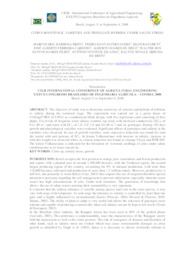Citrus rootstock, varieties and trifoliate hybrids, under saline stress.
Citrus rootstock, varieties and trifoliate hybrids, under saline stress.
Author(s): BRITO, M. E. B.; FERNANDES, P. D.; GHEYI, H. R.; CARDOSO, J. A. F.; MELO, A. S. de; SOARES FILHO, W. dos S.; LIMA, A. N. de; BRITO, K. S. A. de
Summary: The objective of study was to determine sensitivity of varieties and hybrids of trifoliate to salinity during the rootstock stage. The experiment was carried out in a green house of UAEAg/CTRN of UFCG in a randomized block design, with five repetitions each consisting of four plants, five levels of irrigation water salinity (control, tap water with electrical conductivity (ECw) of 0.41 dS m-1 and water with ECw of 1.0; 2.0; 3.0 and 4.0 dS m-1) and six genotypes. During 150 days growth and physiological variables were evaluated. Significant effects of genotypes and salinity in the variables were observed. In case of growth variables, more expressive reduction was found for total dry matter with unit increase of ECw. In lemon Volkameriano with increase in salinity, increase in total dry weight was observed where as a linear reduction was found in citrange Troyer and HTR 069. The lemon Volkameriano is indicated for the formation of rootstock seedlings of citrus under saline conditions due to its lower sensitivity.
Publication year: 2008
Types of publication: Paper in annals and proceedings
Unit: Embrapa Cassava & Fruits
Keywords: Citrus sp, Growth, Salinity stress
Observation
Some of Embrapa's publications are published as ePub files. To read them, use or download one of the following free software options to your computer or mobile device. Android: Google Play Books; IOS: iBooks; Windows and Linux: Calibre.
Access other publications
Access the Agricultural Research Database (BDPA) to consult Embrapa's full library collection and records.
Visit Embrapa Bookstore to purchase books and other publications sold by Embrapa.

